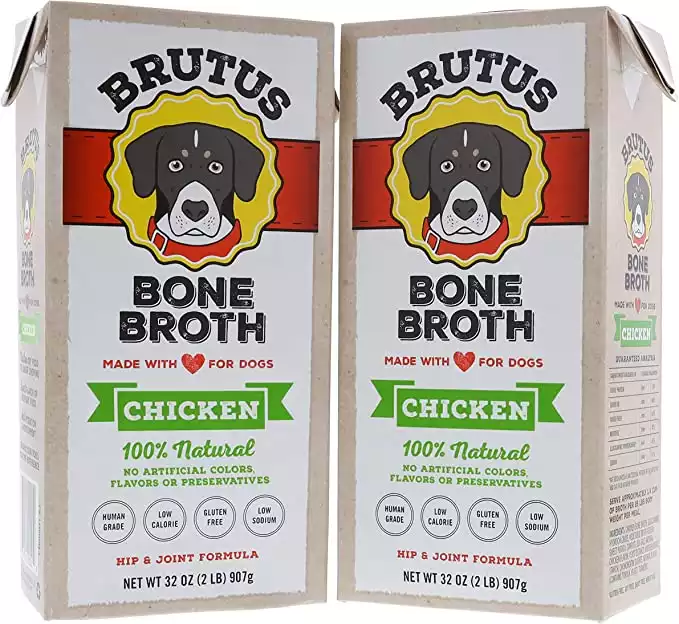How to get your senior dog to gain weight
April 20, 2021 2021-07-10 20:10As an Amazon associate, we earn a small commission from qualifying purchases at no extra cost to you.
Weight loss in a dog of any age is always a cause for concern, but if it happens in senior dogs owners are often specially worried. Is it a sign of a more serious underlying disease? Is loss of appetite a normal occurrence in aging dogs? How to get the dog to eat again? What can you do to help your senior dog gain weight? Does this impact my senior dog’s quality of life?
Sometimes, weight gain is a question of simply changing the type of food the dog eats. At other times it is necessary to address the specific health issues causing the weight loss, such as dental problems, thyroid or kidney issues.
Let’s look in detail at the different ways to get your old dog to gain some weight!
Table of Contents
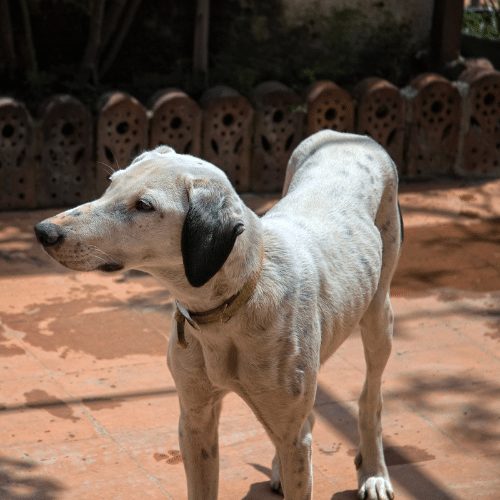
Is it normal for a senior dog to get skinny?
No, it is not normal for a senior dog to suddenly lose a lot of weight. This is especially true if your dog looks truly underweight (such as through ribs and vertebrae showing as well as having visible hip bones).
While weight loss is a common symptom in aging dogs, it should never be ignored. There is often an explanation of this change which can be addressed by giving the dog a thorough vet checkup and potentially changing his diet.
Unfortunately our dogs cannot tell us when something is bothering them or hurts. This is why it is the owner’s task to always be on the lookout for any signs or symptoms that can suggest that he is not feeling well. If you notice that your dog’s behavior or physical condition changed, take him to the vet to get to the bottom of this!
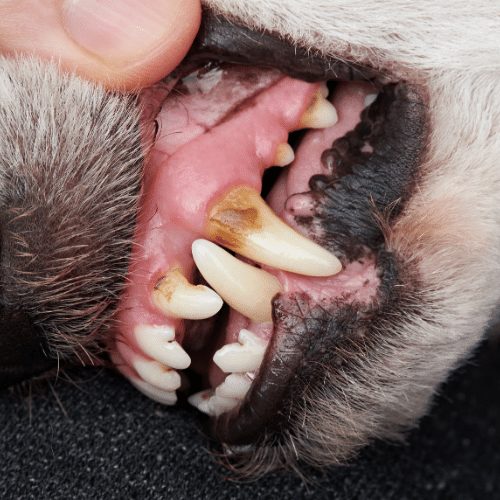
Why is my old dog losing weight even though he is eating?
Without a physical examination, it is impossible to say for sure why your dog is losing weight. Some common causes are:
Dental issues
All aging dogs eventually develop dental problems. These can cause their mouth to smell, but also make eating difficult and painful. Especially if you own other dogs, it could be that your elderly dog appears to be eating the same amount, but in fact he is just nibbling and his siblings eat the majority of his food.
He could also take pieces of kibble in his mouth and spit them out again.
If your aging dog has not recently seen a vet, take him for a checkup and have his teeth looked at. Some dental work can quickly bring his eating habits back to normal, and his weight will go up.
Diabetes
We think of diabetes as a human disease, but dogs can suffer from it as well!
Especially early on these dogs actually will have a big appetite and eat more than before, while losing weight. The reason behind this is that their pancreas stops producing enough insulin which is necessary for the body to absorb blood sugar. Your dog is essentially starving as he is eating.
Other symptoms of diabetes in aging dogs include:
- Increased thirst and subsequent urination
- “Cloudy” eyes
- Chronic infections (especially skin infections or UTIs)
Diabetes is not a condition that resolves itself or can be cured. Your diabetic dog will need you to inject insulin so that he can continue living a happy and healthy life.
Fortunately, diabetes can be well-managed in dogs with treatment. It is crucial that you see a vet if you suspect that your dog may suffer from diabetes as delayed treatment can be dangerous.
Pains and aches
Aging dogs are prone to having joint pain. Hips, knees and shoulders can hurt after a lifetime of running around and being active! As any kind of discomfort, joint pain can make dogs reluctant to eat and cause weight gain. Specifically formulated supplements for senior dogs can help your pup enjoy life again without any pain!
Avoid any unnecessary and strenuous movements, such as having your old dog walk up and down stairs or taking him along for a run. He needs a lot of rest and gentle exercise.
Kidney disease
As dogs (and humans) age, their organ function can deteriorate. Kidney disease is common in aging dogs and can lead to weight loss. Other common symptoms are increased thirst and increased urination. If you suspect kidney disease in your senior dog, take him to the vet to get him checked! With the right medications this condition can be managed well.
(Another symptom for kidney disease can be excessive consumption of water. You should not limit your dog’s access to water to manage potty accidents. Dogs should be allowed to drink at night. If your dog is drinking much more than usual, consult with your vet.)
Cancer
Sadly, one explanation for your dog’s sudden weight loss could be cancer. Canine cancer rates are on the rise and it is becoming more and more common for dogs to eventually suffer from this disease.
The good news is that this is actually a sign of improving health among the canine population.
Cancer is a disease that usually inflicts old animals that have been lucky enough to not suffer from any other diseases. The older an animal (or human) gets, the higher the chance for cancer gets.
Many cancers in dogs are hard to diagnose. Dogs may show signs that are hard to recognize, such as only subtle changes in their behavior or daily routine. The first physical symptom often is weight loss.
If you rule out any other possible causes, your vet might suggest an ultrasound or x-ray to check for possible tumors. The good news is that if diagnosed early, cancer can often be treated successfully and allow your senior dog to live for several more years!
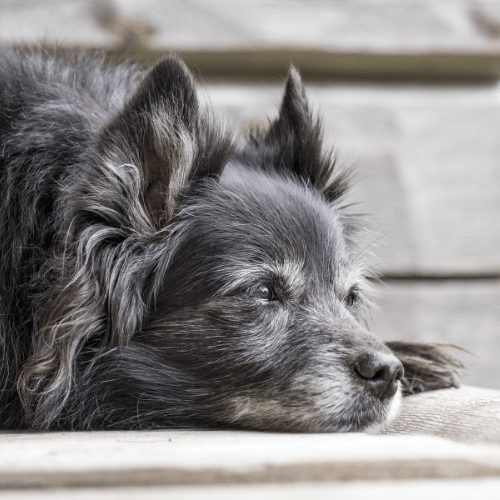
How to get your old dog to gain weight
The best way to have your older dog gain weight (once you ruled out any underlying diseases) is to make his food extra delicious and make sure he has time to eat in peace. If you recently got a puppy (which is not always fair to your older dog), you have to feed them separately and ensure that your senior pup has enough time to eat at his pace.
There are many options for increasing the tastiness of his daily meals. Here are some ideas:
Wet food
Most elderly dogs love wet food. On the one hand it is tasty (nearly all dogs prefer wet food to dry food) and on the other hand it is easy to chew. Especially if your pup’s weight loss has been caused by dental problems, eating soft wet food will make recovery extra easy.
When choosing the right wet food for your pup, do not go for bottom of the line food. While it may be cheaper, it is full of fillers and often does not contain a lot of actual meat.
Soak his kibble
You can soak your older dog’s kibble to make it softer and more tasty. Use a low-sodium broth specifically formulated for dogs. The extra flavor makes many dogs enjoy their food a lot more and gets them to really dig in again.
In addition, soaking it makes the dry food softer and easier to chew for your pup. Once more, if dental problems caused his weight loss, feeding soft food is a perfect solution.
This broth is infused with Glucosamine and Chondroitin - which makes it not only tasty, but also promotes joint health in your dog.
Its low sodium content (only 0.1%) makes it extra healthy for your dog - a much better option than feeding him human-grade broth.
Packed with vitamins and protein, this broth will make your pup's meals extra yummy and healthy.
Treats in between
Just like people, dogs can get a lot of extra calories from snacking! Offer plenty of treats in between meals to your dog. This is especially important for older dogs that cannot eat big meals at once anymore. Having multiple snacks and treats throughout the day will add a lot of extra calories, which will help them gain weight quickly!
Weight gain, yes – but be careful
When you are trying to put some extra pounds on your aging dog, you need to be very careful to not feed him foods that have a high fat content. Unfortunately, fatty foods can lead to pancreatitis – a very painful inflammation of the pancreas which often requires hospitalization.
Even if your pup loves fatty foods, there are healthier ways to indulge him!
Don’t feed the following fatty foods to your senior dog:
- Peanut butter
- Pizza
- Anything that’s been fried
- Butter, grease and oils
- Meat scraps
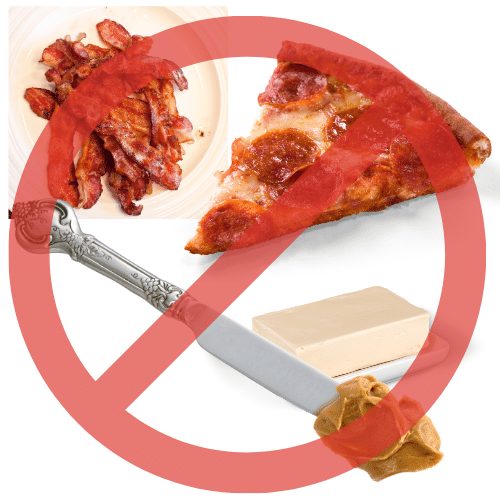
There are much healthier ways to have your aging dog gain weight than by feeding a high-fat diet. You can find many dog foods specifically formulated for aging dogs at your local pet store or on the internet.
The bottom line
Before you try to fatten up your senior dog, you need to find out why exactly he lost weight. A number of conditions can cause weight loss in older pets. If your dog suffers from one of these conditions, simply feeding him more will not be sufficient. He needs to be treated by a veterinarian before you add extra calories to his diet.
Older dogs are especially prone to:
- Kidney disease
- Dental disease
- Diabetes
- Joint pains
- Cancer
If you can rule out these conditions, then it is just a question of making your pup’s food more delicious again!
You can try out wet foods, soaking your dog’s kibble in broth and adding multiple treats throughout the day.
Even though it might be tempting to add high-fat foods to your dog’s diet in order to speed up the weight gain, don’t: This could lead to pancreatitis, which is a very painful condition that is expensive to treat. Instead, use healthy foods specifically formulated for aging dogs. That way you can be certain that your dog’s nutritional needs are met as you help him gain some pounds.

